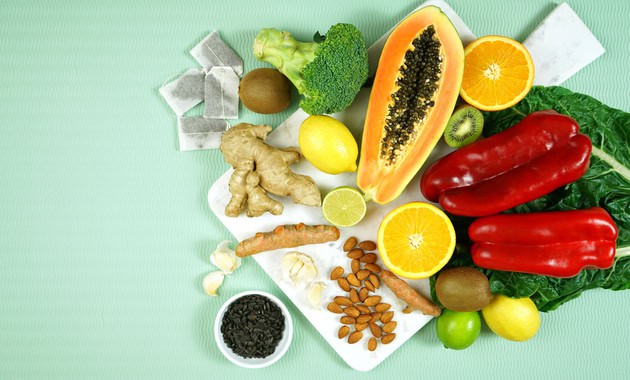
Covid-19 is the disease caused by the SARS-CoV-2 virus. Whenever a pathogen enters our body, our immune system gets activated and initiates a protective inflammatory response. However, it is highly crucial to keep this inflammation under control because excess of it can be damaging.
While medicines do their job in controlling the inflammation, you can support your medicines’ actions by eating foods that are rich in antioxidants and have anti-inflammatory properties. The reason being, the food you eat can have a significant amount of impact on how aggravated the inflammation initiated by your immune system is and can support your recovery from the disease.
Let’s find out what an ideal diet for corona patients looks like and how should they distribute healthy food options throughout the day so as to gain strength and recover from their disease.
Rise and Shine Meal
– Covid-19 patients are prescribed to take antacid medicine on an empty stomach in the morning.
– Once taken, you can sip through a glass of honey lemon drink to start off your day.
– After an hour, you can eat fresh sprouts and a hot turmeric ginger drink.
Break the morning fast
– Take a one-hour break after the early morning sprout snack and then eat a light breakfast with ragi java which is a nutritious drink made out of ragi and water or milk.
– You may even take masala chai (sugarless)
Mid-morning Snack
– After about 2 hours of eating your breakfast, hydrate your body and satisfy your hunger pang with fresh vegetable juice that’s made of carrot, tomato, coriander leaves, spinach, cucumber and ginger or amla.
– We can’t insist enough on replacing packaged foods, biscuits or others with healthier alternatives like fruits, juices, nuts and seeds.
For optimum health, replace your bag of chips with healthy snacks from here
Lunching at Noon
– Time for a heavy, nutrient-dense meal two to two-and-a-half hours after the mid-morning snack.
– Fill half your plate with a stomach-filling quantity of fresh vegetable salad, including cucumbers, carrots, tomatoes, onion rings dressed with extra virgin olive oil, coriander, and a few black grapes or strawberries.
– Fill the remaining half with rice and 2 phulkas, dal variant curry, 1 boiled curry (beans & carrot; carrot & beetroot; cabbage), and curd.
Post-meal Snacking
– Post 2-3 hours of enjoying your lunch, take fresh mixed fruit juice, using carrot and grapes.
Evening Tea
– Rest for 2-3 hours after your glass of juice before sipping on your cup of ginger chai along with fiber-rich biscuits and/or boiled/soaked nuts.
Sum up the supper
– Non-vegetarians can devour a bowl of chicken soup (boiled for long with spices to an extent that the chicken splits up into small fragments).
– Vegetarians can sip through a bowl of nutrient-rich vegetable soup.
– Time it 2-3 hours after the evening tea.
Dine night
– The last phase of diet for corona patients should be kept light. Eat 1 phulka with a light curry and buttermilk at least 2 hours after your supper.
Good night drink
– Allow 2 hours of time to pass and then enjoy a glass of pepper & turmeric milk.
Remember:
The ingredients and their amount may vary for people who are dealing with other health conditions. So, it is best to seek a doctor’s advice to know which food is best suitable for you to fight inflammation.
5 simple tips on diet for corona patients
The target is to:
1. Avoid inflammatory foods such as sugary and salty foods and drinks, refined foods (white bread and pasta), fried foods, alcohol, packaged food items, and processed meat (hot dogs and sausages).
2. Amp up on foods rich in anti-inflammatory properties like tomatoes, olive oil, green leafy vegetables (spinach, kale), nuts (almonds and walnuts), fatty fish rich in omega-3 (salmon, mackerel, tuna, and sardines), fruits (strawberries, blueberries, cherries, and oranges) [2].
3. Include foods that are alkaline in nature. This ensures that what you eat gets easily digested, thereby increasing the digestive capacity (fire, as it is called in Ayurveda). In an alkaline diet, you eat more vegetables, fruits and drink lots of water while cutting back on sugar, eggs, alcohol, meat and processed foods as they’re more acidic[3].
4. Have a rainbow palette diet because plants are the richest in anti-inflammatory nutrients, which are a crucial part of the ideal diet for corona patients. Along with eating whole grains and legumes, include vegetables and fruits of every color. This is the best way to get ample anti-inflammatory foods[4].
5. Eat antioxidant-rich foods as they prevent, delay and repair cell damage. Eat an adequate amount of colorful fruits and veggies like berries, leafy greens, beets and avocados, as well as beans and lentils, whole grains, ginger, turmeric and green tea[4].
(The article is reviewed by Dr. Varun Gupta, MBBS, MD (Pharmacology))
Recommended Reads
How To Stay Healthy During COVID-19 Outbreak?
COVID-19 and Pregnancy: Things You Must Know
Are You Using The Right Masks To Prevent COVID-19?
References
[1] Roberto de la Rica, Marcio Borges and Marta Gonzalez-Freire. COVID-19: In the Eye of the Cytokine Storm. Front Immunol. 2020; 11. https://www.ncbi.nlm.nih.gov/pmc/articles/PMC7541915/
[2] Foods that fight inflammation. Harvard Health. https://www.health.harvard.edu/staying-healthy/foods-that-fight-inflammation
[3] The alkaline diet: what you need to know. The University of Texas MD Anderson Cancer Center. https://www.mdanderson.org/publications/focused-on-health/the-alkaline-diet–what-you-need-to-know.h18-1592202.html
[4] How to use food to help your body fight inflammation. Mayo Clinic. https://www.mayoclinic.org/healthy-lifestyle/nutrition-and-healthy-eating/in-depth/how-to-use-food-to-help-your-body-fight-inflammation/art-20457586